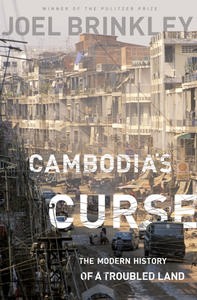August 28, 2008By JOEL BRINKLEY
McClatchy-Tribune News Service (USA)
Well past the city limits, beyond the sign that says "Bon Voyage; See You Again," after the paved roads end, down a rutted dirt track, Un Thea sits in the mud outside her shanty house, peeling bamboo shoots - and seething.
Two years ago, soldiers and police showed up in the middle of the night to throw her family and more than 1,000 others out of their homes on a plot in central Phnom Penh. The soldiers torched the crude houses before Un and the others had time even to retrieve their meager belongings. Then all of the residents were herded onto buses and ferried out here, about 15 miles away, and dumped in a rice paddy without so much as a bottle of water or a tarp for cover.
Then the soldiers left - though a few stayed behind to turn away the aid groups that came out to drop off emergency rations. Un's case is among several thousands more or less similar land seizures across Cambodia in the last three years.
"Out here, it is hard making business," Un complains with considerable understatement. She is 25 but already looks decades older. "They dumped us here and gave us no money, no land title. Nothing."
Cambodia is a democracy. The modern state grew out of a U.N. peace conference in 1991 intended to create a free nation from the rubble the Khmer Rouge left behind. Since then, the government has purported to manage the country according to the rule of law.
Every democratic country, including the United States, fails at times to live up to its democratic ideals. But the cruelty the Cambodian government visits upon its weakest citizens can be breathtaking. You expect this in North Korea, or Zimbabwe. But Cambodia? In late July Cambodians voted in national elections that were generally peaceful with scattered complaints. Government leaders tolerate human rights groups that regularly castigate them and, within limits, critical stories in the news media.
Still, stories like Un's can overwhelm the positive developments here.
Chum Bon Rong is secretary of state in the National Land Authority, which is supposed to arbitrate land disputes like the Andoung case. Last week he told me that his agency has received more than 3,000 land-seizure appeals in the last two and one-half years. Of those, he acknowledged, only about 50 have been judged in favor of plaintiffs, the impoverished people whose land was seized. Even among those 50, he acknowledged with a rueful grin, "sometimes the cases disappear" after referral to another agency that is supposed to implement the Land Authority's findings.
In 2001, under pressure from the West, Cambodia enacted a Land Law that was supposed to set clear rules for property disputes. Seven years later, the government has yet to write the regulations implementing that law. Meantime, the seizures continue unabated. Phnom Penh is booming, and when a developer spots a choice piece of land, he simply pays off the proper official to win a newly minted land title. All that's left is rid the property of its pesky residents - almost always poor, uneducated people like Un.
Once the residents have been disposed of, they are forgotten. Licadho, a local human rights group, noted in a new report that Un and the others dumped out here suffer from "malnutrition, typhoid, dengue fever, hepatitis A or B, hypertension, respiratory tract infections, gastro-intestinal illnesses including stress-related ulcers, depression," and last in this litany, "anger management problems." Um and her husband built a one-room shelter on stilts from scrap wood, bamboo matting and plastic tarps. Ten people now live in and under the house. She has no electricity or running water. No one in this community has a phone; there's not a single toilet.
"We have to buy water from the water seller," she says, nodding toward an earthen cistern beside the house. Mosquito larvae seem to roil the water surface. Tacked to her shelter's front wall, a poster warns of dengue fever, a mosquito-borne illness.
Um says she can make about 5,000 riel selling her peeled bamboo shoots at market. That's $1.22. She sends her young sons into Phnom Penh "to shine shoes for the people. They go and stay for a month."
A few months ago, the United Nations issued a report saying the government here always "tilts in favor of businesses" that want to develop land, "pitting poor farmers against developers." Even though his own agency's numbers show the very same thing, Chum says complaints like that from abroad are "a case of propaganda."




































